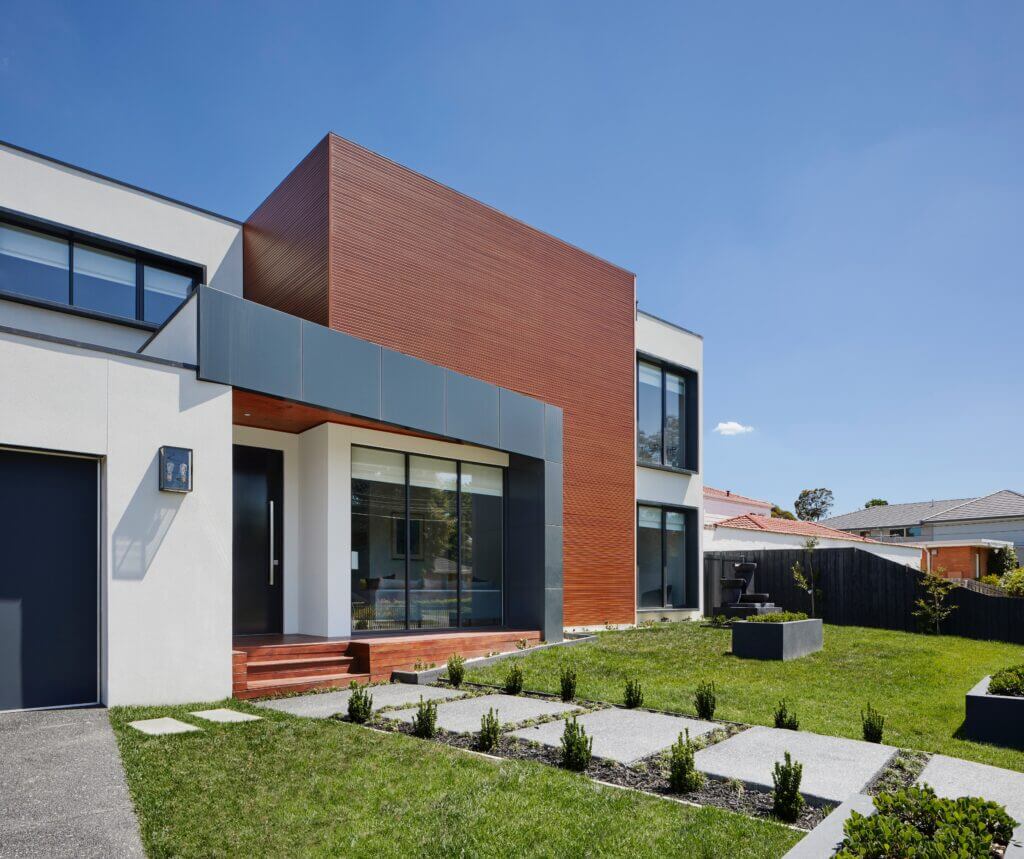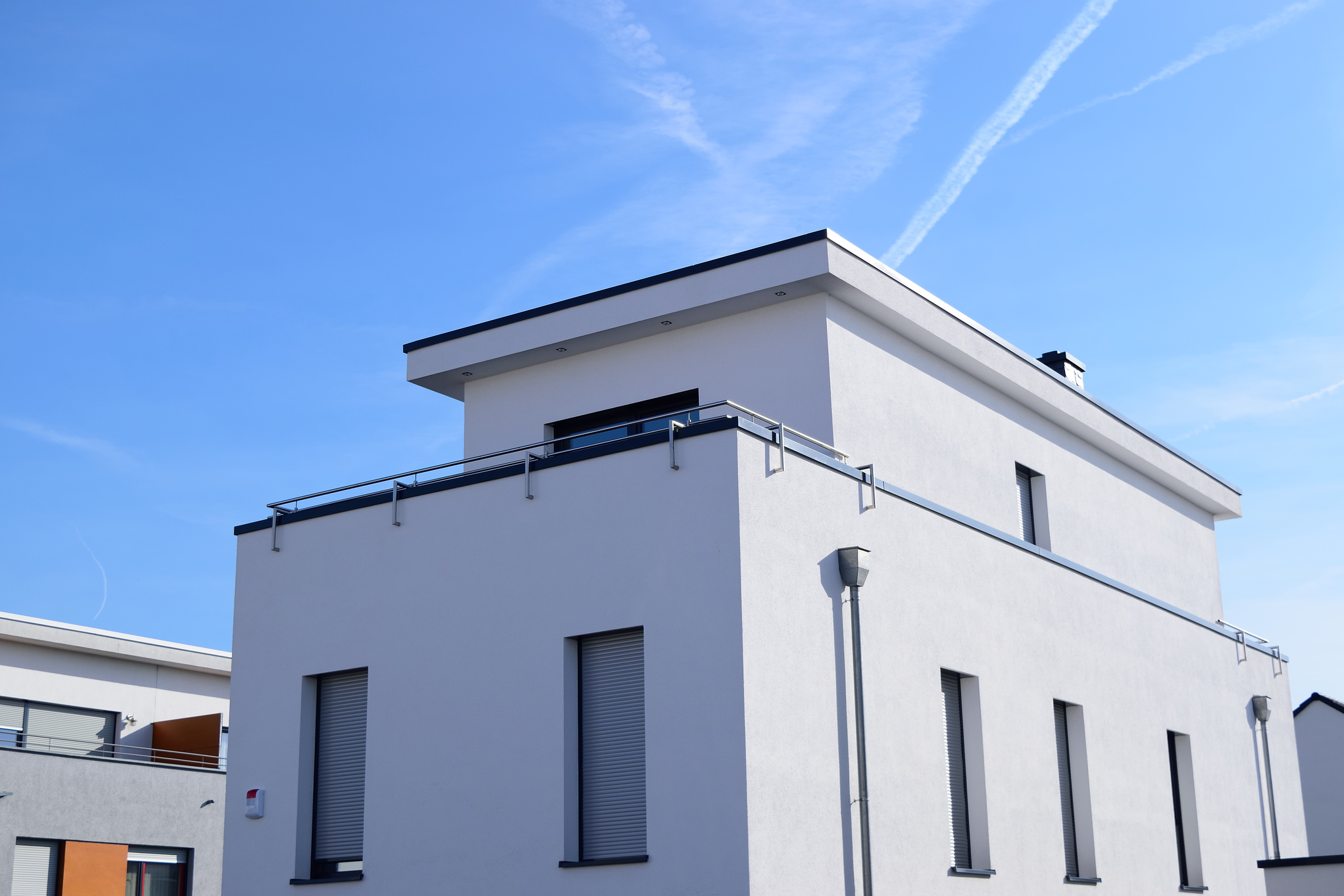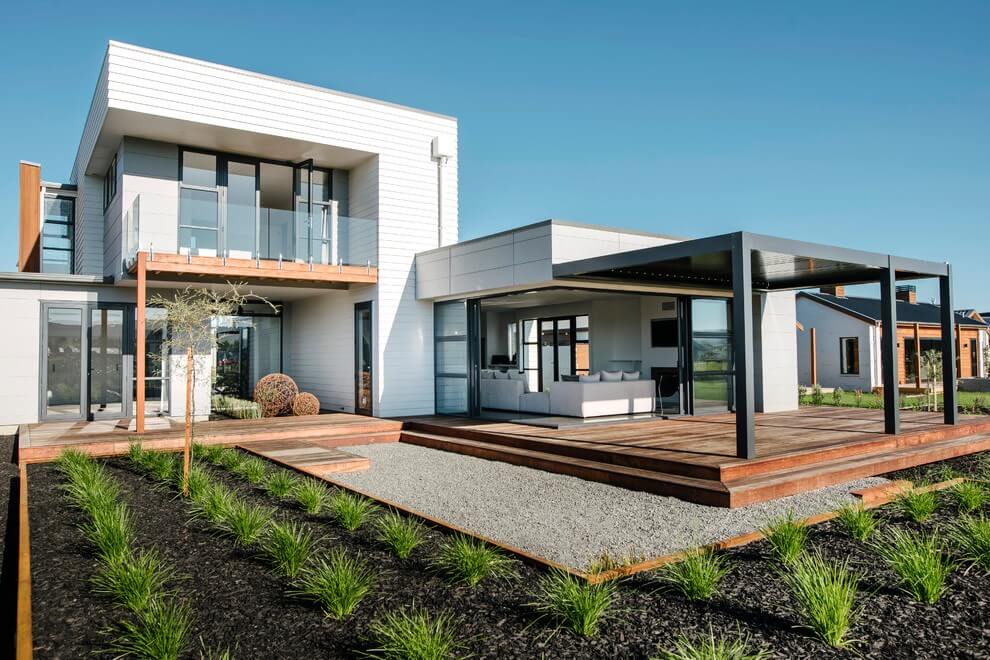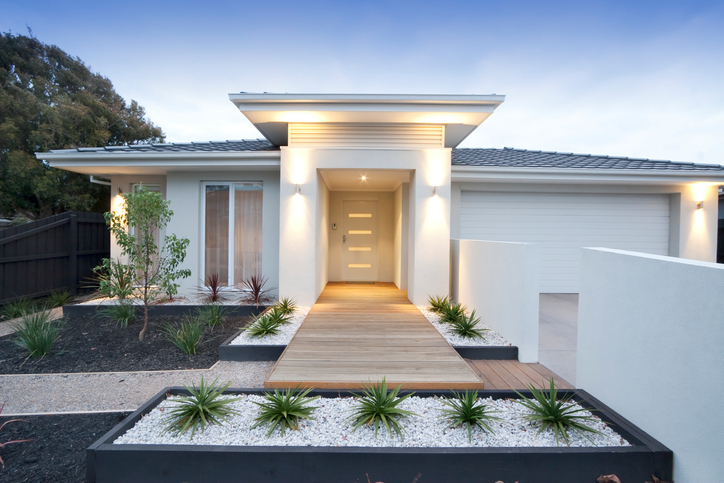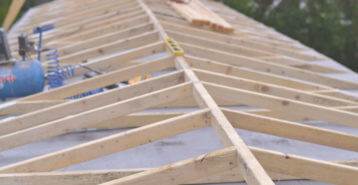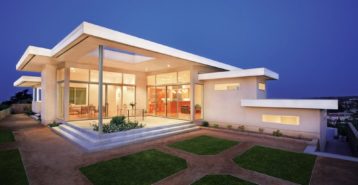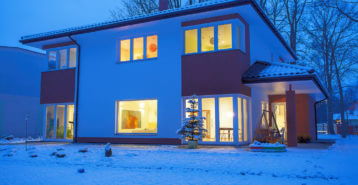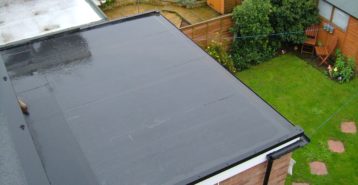Homeowners exploring roof options who prefer more modern designs may be interested in a flat roof. These sleek roofs provide a level of curb appeal that pitched roofs cannot match, but is it the right option for your home? In this article, we’ll explore everything you need to know about a flat roof on a house – including features of flat roofs, the most common types, pros and cons, and the cost to replace a flat roof.
What is a Flat Roof?
A flat roof is a roof that appears almost completely level in contrast to its sloped counterparts, such as a hip roof or mansard roof. Flat roofs are currently most common in commercial and industrial buildings, mid-century modern design, and in arid climates.
These roofs actually have a very slight slope (10 degrees or less) so that water can drain properly.
Why to Consider One
Flat roofs are becoming an increasingly popular design for homes due primarily to:
- lower installation costs
- lower repair costs
- modern appearance and ability to add a rooftop entertainment space
Since these roofs take up less surface area than sloped roofs, they require less square footage of building materials – which helps to keep costs down. Additionally, they offer a sleek design and the chance to utilize the roof space for a patio, garden, or other outdoor and entertaining purposes.
How Much Does It Cost to Replace a Flat Roof?
Much like other home renovation projects, the cost to install or replace a flat roof can depend on a number of factors, including home size, and if there are any regulatory demands that need to be met (such as in Florida or California).
Here’s the cost breakdown for a typical flat roof replacement project:
1. Flat Roof Replacement Cost per Square Foot
On average, a flat roof should cost $250 to $900 per roofing square (100 square feet), or $2.50 to $9 per square foot, which includes the cost of both roof materials plus installation and labor. For a 1,600 square foot flat roof, the cost would range from $4,000 to $14,400 on average.
2. Labor and Installation
Labor and installation typically costs $40 to $80 per hour for a flat roof installation, with some projects requiring as much as $500 or more just for labor, depending on where you live. For instance, roofing work in metro areas tends to cost more than it does in rural areas.
Installation will typically take anywhere from two to five days to complete. The labor and installation cost can also vary depending on the complexity for the roof materials you choose.
3. Old Roof Removal
If you need to remove an old or damaged roof before replacing it with a new roof, this will cost about $1 to $5 per square foot of roofing removed. However, removal and disposal costs can vary across contractors, so be sure to ask about this specific cost for your home when evaluating a quote from your local roofing contractor.
4. Other Potential Costs
Other potential cost factors to consider when building a budget for your roof replacement project include:
- Roof sealant: $400 to $1,600
- Drain system installation: $600 to $1,000
- Roof vent installation: $300 to $650
- Permitting: $250 and up (depending on roof size)
- Inspection: $100 to $300
Since no project is exactly the same, we encourage homeowners to use our Roofing Cost Calculator tool to get a project estimate for free before calling contractors and evaluating quotes.
Flat Roof Materials
Here are the most common material options and their costs.
| Flat roof material | Average cost per square foot |
|---|---|
| Metal | $3.25 to $14.25 |
| Built up roof (BUR) | $2.50 to $4 |
| Modified bitumen | $2.50 to $4.50 |
| Rubber membrane | $6.50 to $9.50 |
Metal Flat Roof
Metal, specifically aluminum, is one of the most popular materials used for flat roof replacement thanks to its durability. This material reflects heat from the sun, which helps keep energy costs down. Metal roofing typically comes in large sheets, but you can order smaller sizes to fit around unique features or irregular extensions of your roof—for example, small patios, or covered stairwells. The average cost to install a flat metal roof is $3.25 to $14.25 per square foot.
Built-Up Roof (BUR)
A built-up roof (BUR) system uses several layers of natural or synthetic roofing with layers of tar or asphalt that are hot-applied and topped with gravel. This helps reflect sunlight and protect the layers beneath. Sometimes a reflective coating is applied instead of tar and gravel. In general, the more layers, the more durable the roof—and the heavier. The BUR is one of the most affordable and reliable options for flat roofs. The average cost to install a flat BUR roof is $2.50 to $4 per square foot.
Modified Bitumen Roof
These roofs feature rolled-out overlapping, single, or double-ply asphalt sheets, and are either heat-applied or self-adhering. This flat roofing material can also be coated with a reflective coating to enhance their weatherproofing, and you’ll need fewer layers compared to BURs. A durable option, these roofs are more costly than BURs but more affordable than the final, common option. The average cost to install a flat modified bitumen roof is $2.50 to $4.50 per square foot.
Rubber Membrane Roof
Membrane roofs have become increasingly popular as a single-layer, watertight alternative to BURs. Single-ply membrane systems use flexible, waterproof sheets made from synthetic materials—most commonly thermoplastic olefin (TPO), polyvinyl chloride (PVC), or ethylene propylene diene M-class rubber (EPDM), which typically comes in either black or white. The average cost to install a flat rubber roof is $6.50 to $9.50 per square foot.
Rubber membrane flat roofs tend to be the priciest compared to other materials listed above. However, they are durable, resistant to sunlight, and easy to fix should you detect damage or leaks in the future.
Flat Roof Features
What makes a flat roof different from other types of roof designs? It can be defined by these features:
Slope
Despite its name, this style is not totally flat. All roofs need some level of slope in order to move water off the roof during rain and snow melts. Roof pitches are measured using a system that looks at their fall over a single foot. Flat roofs typically fall three inches (or even less) vertically over a 12-inch horizontal width—compared to pitched roofs which fall four or more inches vertically over the same area.
Design
A flat roof on a home boasts a minimalist style, mid-century modern design, elongated form, and is perfectly linear (to the naked eye, at least).
In order to be efficient, however, the roof style is anything but simple and requires utmost precision to prevent water pooling.
Pros and Cons of Installing a Flat Roof
There are several advantages and disadvantages to weigh before moving forward with installation.
Pros
- Low cost and more economical to install compared to other roofing options.
- Less risk and labor are involved in the installation process.
- Typically require repairs less frequently compared to pitched roofs.
- Allow for more temperature-controlled living space compared to pitched roofs.
- Allow for more usable space to install solar panels, passive lighting such as skylights, and air conditioning components.
- Can be utilized as an additional outdoor living space, a garden, a greenhouse, or a number of other unique features.
- Much more wind-resistant than their pitched roof counterparts.
Cons
- Do not last as long as other roof styles.
- Little to no attic or storage space under the roof.
- Not as effective as pitched roofs at moving water or snow away from the home, which can result in water pooling.
- More prone to mold.
- While they typically require less maintenance, water pooling issues can require more frequent maintenance.
- Less insulated than traditional roofing, which can lead to poor protection from outside elements during extreme weather.
- More prone to debris build-up from leaves, pine needles, branches, and more.
- Require more frequent inspections in order to ensure no issues are at play.
Preventing Problems with Your Flat Roof
While these roofs provide homeowners with several benefits, there can be some drawbacks if you do not conduct regular and proper maintenance. Here are a few strategies to properly maintain a flat roof and prevent damage:
- Inspect and clean gutters twice a year to ensure proper rainwater drainage.
- Clear debris off the roof regularly to avoid water pooling, mold, and other damage.
- Have a professional inspect your roof twice a year – once in the summer and once in the winter – to prevent costly repairs.
- Seal your flat roof with a waterproof coating – especially if your roof uses asphalt, tile, or other porous materials.
- Have your roof thoroughly inspected to determine if it needs a replacement after 10 to 15 years (the average flat roof lifespan).
The Bottom Line
A flat roof may be the best choice for you if you are looking to add additional outdoor entertaining space, do not need attic storage, and are interested in a lower installation cost (though potentially more/higher maintenance costs) for your roof replacement. This roof style complements modern home exteriors particularly well. It gives your home a sleek, minimalist curb appeal and opens up lots of possibilities for what to do with the potential square footage you have added to your rooftop.
We recommend getting quotes from three to four roofing contractors. This helps ensure you find someone who has a lot of experience installing flat roofs as well as gives you a strong position from which to negotiate pricing. Modernize can match you with up to four roofing pros in your area. Click below to get started.
Compare top-rated roofing pros in your area.
Read real homeowner reviews, explore qualifications, and view promotions. Modernize makes it easy to browse professionals and find one that will be perfect for your project.
